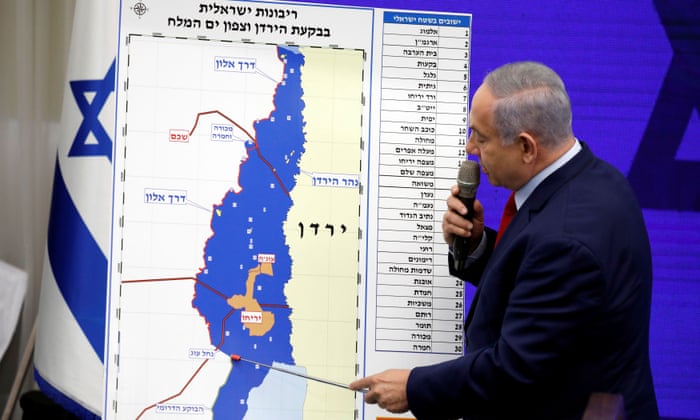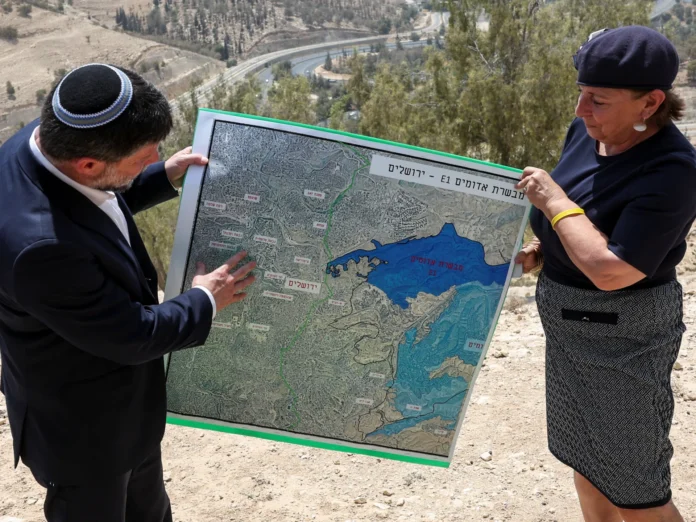Sweeping Proposal Sparks Alarm Across Region
Israeli Finance Minister Bezalel Smotrich has unveiled a far-reaching proposal to annex 82 percent of the occupied West Bank, a move that has provoked sharp warnings from international partners and reignited concerns over regional stability.
Speaking at a press event in Jerusalem alongside Yesha Council Chairman Yisrael Gantz, Smotrich declared that “2025 will be the year of sovereignty in the West Bank.” His plan centers on the principle of “maximum territory, minimum population,” effectively expanding Israeli jurisdiction over vast areas of land while avoiding direct control of densely populated Palestinian urban centers.
The announcement, which Smotrich described as a preemptive measure against growing international recognition of Palestinian statehood, has triggered alarm among Israel’s allies and neighboring Arab states.
International Timing Heightens Tensions

Smotrich’s proposal comes at a sensitive diplomatic moment. Several Western nations, including France, the United Kingdom, Belgium, Canada, and Australia, are preparing to endorse Palestinian statehood during the upcoming United Nations General Assembly session. Over 140 countries already recognize Palestine as a state, and momentum for broader recognition has been building.
According to reports in The New York Times, Smotrich framed annexation as a defensive strategy, arguing it would block what he called “a diplomatic offensive” aimed at pressuring Israel into accepting a Palestinian state. His comments follow Israel’s recent approval of the controversial E1 settlement project, a development plan that would divide the West Bank and cut off East Jerusalem from Palestinian communities.
Observers note that the timing of Smotrich’s statement appears calculated to assert Israeli control before new international decisions on Palestinian recognition take effect.
UAE Issues Strong Warning Over “Red Line”
Perhaps the most forceful reaction so far has come from the United Arab Emirates, a key signatory of the 2020 Abraham Accords that normalized relations with Israel. In remarks to Reuters, Assistant Minister for Political Affairs Lana Nusseibeh warned that annexation in the West Bank “would constitute a red line for the UAE.”
Nusseibeh stressed that such a move would “severely undermine the vision and spirit of the Abraham Accords.” The UAE had championed normalization partly on the premise that it would keep the prospect of a two-state solution alive. Abu Dhabi has repeatedly emphasized its support for Palestinian self-determination, framing it as central to its regional diplomacy.
Diplomatic analysts suggest that an Israeli annexation push could unravel years of careful rapprochement between Israel and Arab Gulf states, potentially halting further normalization agreements with countries such as Saudi Arabia.
Unclear Government Backing and Policy Details

Despite the sweeping rhetoric, Smotrich has offered few concrete details on how his annexation plan would function. Roughly 3 million Palestinians live in the West Bank, and the minister suggested they would initially remain under Palestinian Authority management for civil affairs. He hinted at future “regional alternatives,” but provided no specifics on governance, security, or movement rights.
It is also uncertain whether Prime Minister Benjamin Netanyahu and his cabinet support the proposal. According to CNN, Netanyahu has scheduled meetings with senior ministers to discuss possible responses to Western recognition of Palestine. Options reportedly under review range from limited settlement annexation to broader claims similar to those outlined by Smotrich.
Some Israeli officials view the proposal as a bargaining tool rather than an actionable plan, while others see it as part of a long-term ideological push by right-wing factions within the government.
Strong International Backlash
The Palestinian Authority swiftly condemned Smotrich’s remarks, calling them a “direct threat” to Palestinian statehood and a violation of international law. Palestinian officials urged the global community to intervene, warning that annexation would extinguish hopes for a two-state solution.
Meanwhile, 21 countries—including close Israeli allies—have signed a joint statement criticizing Israel’s approval of the E1 settlement project. The statement described the move as “unacceptable and contrary to international law.”
European diplomats have privately cautioned that unilateral annexation could trigger sanctions, deepen Israel’s diplomatic isolation, and inflame unrest in the region.
Regional and Global Implications
Analysts warn that Smotrich’s proposal, if pursued, could destabilize not only Israeli-Palestinian relations but also Israel’s broader standing in the Middle East. The Abraham Accords, hailed just a few years ago as a breakthrough in Arab-Israeli relations, could suffer serious damage if the UAE and other signatories perceive annexation as a betrayal of their commitments.
For Palestinians, the plan would mean further fragmentation of territory, with urban centers surrounded by Israeli-controlled land. Critics argue this would render a contiguous, viable Palestinian state virtually impossible, solidifying a system of permanent occupation.
For Israel, however, right-wing supporters of annexation see the proposal as a historic opportunity to secure strategic depth and consolidate settlements under Israeli sovereignty before global diplomatic pressures mount.
Outlook
Whether Smotrich’s vision advances beyond rhetoric will depend largely on internal Israeli politics and international reaction. Netanyahu, facing growing pressure from both allies abroad and right-wing partners at home, must navigate a precarious balance.
As the UN prepares to deliberate on Palestinian statehood recognition, the coming weeks are likely to prove decisive. If Israel pursues annexation, it risks unraveling regional partnerships, intensifying global criticism, and further complicating an already fragile peace process.
At stake is not only the future of Israeli-Palestinian relations but also the stability of broader Middle Eastern diplomacy.
Sources: Al Jazeera

